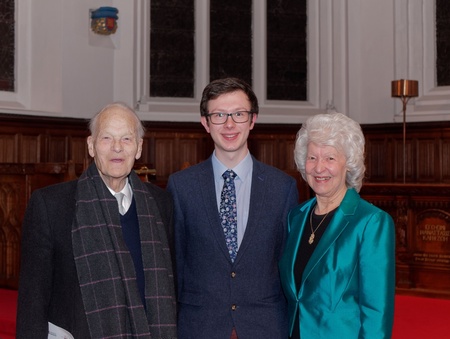Music students at the University of Aberdeen have celebrated the 'distinguished career and outstanding contribution' of Professor Derek Ogston, who has been associated with the University for 70 years.
Music staff, members of the University community and guests from various musical groups in the city attended the event, which was held at King’s College Chapel. It was organised by James Aburn a music student and assistant director of the University chapel choir to give thanks to Professor Ogston for his continued support to the discipline.
Dr Phillip Cooke, Head of Music and Senior Lecturer in Composition, said Professor Ogston was an integral part of music-making at the University whose continued support had greatly benefited a generation of musicians.
“Professor Ogston’s support has not only been of the high-profile events that bear his name - such as the prestigious Ogston Music Prize, a highlight of the musical calendar - but to countless other endeavours both small and large, and supporting many students through scholarships, bursaries and prizes.
“This concert was a small token of appreciation to Derek and a recognition of the incredible service he has given to the university throughout his career. We are proud to have Derek as one of our closest friends and benefactors.”
Professor Ogston said: "I cannot tell you how surprised and honoured I was by the magnificent concert performed by the music students on the occasion of my 70th year in the University of Aberdeen. I was also so touched by the comments made by the students. It has been the highlight of my time in the University."
Professor Ogston first entered the University of Aberdeen at the age of 17 and, following an arts degree, went on to study for a career in medicine. He graduated in 1957 with honours, and he was the recipient of medals for medicine, surgery and child health. His medical degree began with House Officer posts at Aberdeen Royal Infirmary and a research fellowship in the Department of Medicine.
In 1962, Professor Ogston became a member of the teaching staff of the University and, from 1969 to 1975, he was Senior Lecturer in Medicine, becoming a Reader in 1975. He was promoted to the Regius Chair of Physiology in 1977, and subsequently became Professor of Clinical Medicine in 1983.
During his time in medicine, Professor Ogston wrote more than 170 papers and travelled extensively, representing the University abroad on many occasions. From 1984 to 1987, he was Dean of the Faculty of Medicine and, in 1988, was promoted to Vice-Principal.
During his last four years of service, he was Senior Vice-Principal of the University, a position which saw him play a major role in preparing and organising celebrations to mark the Quincentenary of the University in 1995.
Throughout his retirement, Professor Ogston’s support and service to the university continued as he donated paintings, contributed to the purchase and instalment of the Aubertin Organ, and produced a book on King’s College. He also served on the University Business Committee and as General Council Assessor to the University Court, as well as taking a course in Fine Arts, gaining an MLitt degree, followed by further study in theology, graduating with a BTh.
Professor Ogston always took a great interest in student welfare, as well as student activities and societies, giving constant encouragement to those studying music. His support for the Opera Society and the King’s College Chapel Choir resulted in exceptional opportunities being available for student members, and there are several Ogston Scholarships for both under and postgraduate students, as well as several Ogston awards which are presented each year following the graduations, as well as the prestigious Ogston Prize.
He also contributes financially to enable groups and ensembles to visit and perform and supports the King’s Philharmonic Wind Orchestra and the Spectrum Composition Award. He has also been the recipient of several awards: in 1995, he received a CBE and, in 2007, he was presented with an honorary degree from the University in recognition of his outstanding contribution. In 2016, he was presented with a Benefactor’s Medal.


